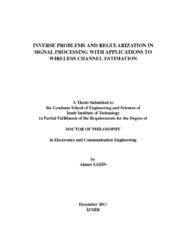Please use this identifier to cite or link to this item:
https://hdl.handle.net/11147/2903Full metadata record
| DC Field | Value | Language |
|---|---|---|
| dc.contributor.advisor | Altınkaya, Mustafa Aziz | - |
| dc.contributor.author | Şahin, Ahmet | - |
| dc.date.accessioned | 2014-07-22T13:48:35Z | - |
| dc.date.available | 2014-07-22T13:48:35Z | - |
| dc.date.issued | 2011 | - |
| dc.identifier.uri | http://hdl.handle.net/11147/2903 | - |
| dc.description | Thesis (Doctoral)--Izmir Institute of Technology, Electronics and Communication Engineering, Izmir, 2011 | en_US |
| dc.description | Includes bibliographical references (leaves: 116-120) | en_US |
| dc.description | Text in English; Abstract: Turkish and English | en_US |
| dc.description | xvii, 122 leaves | en_US |
| dc.description | Full text release delayed at author's request until 2015.01.15 | en_US |
| dc.description.abstract | The research presented in this thesis is on inverse problems encountered in the field of signal processing. Theory, classification and solution techniques of linear discrete inverse problems (LDIP) are investigated. LDIP are classified as underdetermined LDIP (ULDIP) and overdetermined LDIP (OLDIP). The solution methods developed for LDIP are applied to the particular problems of signal processing mainly channel estimation, equalization and compressive sampling. A new solution technique named constraint removal (CR) is presented for ULDIP type problems with sparse inputs. CR is applied to terrestrial digital TV (DTV) channel estimation. CR is also compared with subspace pursuit (SP) and linear programming. Regularization and optimum regularization parameter selection for ill-posed OLDIP type problems are discussed. Sparse channel estimation for wireless digital communications is investigated. A new channel estimation method, permuted deconvolution (PDEC), for long delay spread channels with short training sequences is proposed and compared with other methods. A review on equalization is presented. Different equalization techniques are discussed and compared. DFE is explained from an inverse problem perspective. A new non-feedback equalization technique called frequency compensated linear equalization (FC-LE) for sparse channels is presented and compared with DFE. | en_US |
| dc.language.iso | en | en_US |
| dc.publisher | Izmir Institute of Technology | en_US |
| dc.rights | info:eu-repo/semantics/openAccess | en_US |
| dc.subject.lcsh | Signal processing | en |
| dc.subject.lcsh | Inverse problems (Differential equations) | en |
| dc.subject.lcsh | Wireless communication systems | en |
| dc.title | Inverse Problems and Regularization in Signal Processing With Applications To Wireless Channel Estimation | en_US |
| dc.type | Doctoral Thesis | en_US |
| dc.department | Thesis (Doctoral)--İzmir Institute of Technology, Electrical and Electronics Engineering | en_US |
| dc.relation.publicationcategory | Tez | en_US |
| dc.identifier.wosquality | N/A | - |
| dc.identifier.scopusquality | N/A | - |
| item.openairecristype | http://purl.org/coar/resource_type/c_18cf | - |
| item.languageiso639-1 | en | - |
| item.openairetype | Doctoral Thesis | - |
| item.grantfulltext | open | - |
| item.fulltext | With Fulltext | - |
| item.cerifentitytype | Publications | - |
| Appears in Collections: | Phd Degree / Doktora | |
Files in This Item:
| File | Description | Size | Format | |
|---|---|---|---|---|
| 421382.pdf | DoctoralThesis | 1.21 MB | Adobe PDF |  View/Open |
CORE Recommender
Page view(s)
224
checked on Mar 31, 2025
Download(s)
194
checked on Mar 31, 2025
Google ScholarTM
Check
Items in GCRIS Repository are protected by copyright, with all rights reserved, unless otherwise indicated.